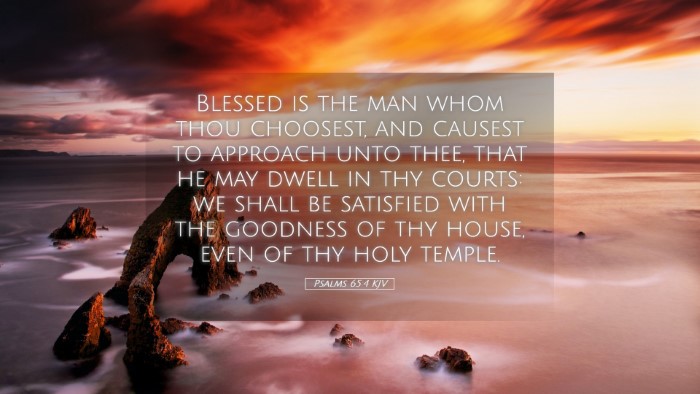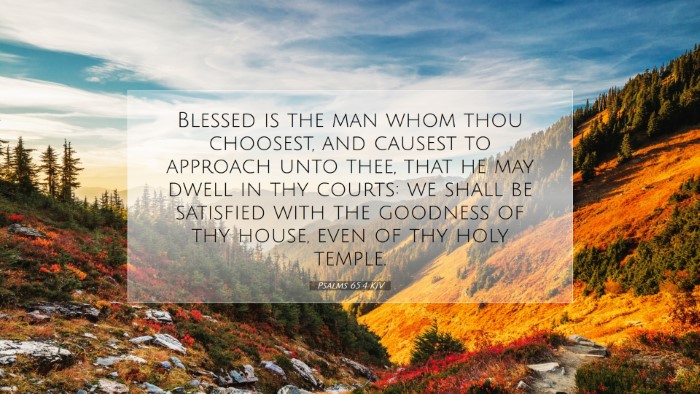Commentary on Psalms 65:4
Verse Context: Psalms 65:4 states, "Blessed is the man whom thou choosest, and causest to approach unto thee, that he may dwell in thy courts: we shall be satisfied with the goodness of thy house, even of thy holy temple." This verse is a significant declaration regarding God's divine selection of individuals whom He invites into a close relationship with Himself.
General Overview
This verse expresses profound theological themes of divine election, intimacy with God, and satisfaction in His presence. Various public domain commentaries shed light on these rich meanings. The sentiments expressed by Matthew Henry, Albert Barnes, and Adam Clarke provide valuable insights for understanding the depth of this scripture.
Insights from Matthew Henry
Matthew Henry emphasizes the blessedness of being chosen by God. He notes that:
- Divine Choice: God’s sovereignty is highlighted in His choosing of certain individuals to come near to Him. This act illustrates both His grace and mercy.
- Approach to God: The invitation to approach God indicates a relational aspect; the believer feels the call to intimacy with the Creator who desires communion with humanity.
- Satisfaction in God's Presence: Henry reflects on the joy and fulfillment that comes from being in God’s “courts.” There is a contrast between the worldly pursuits and the spiritual satisfaction found in God's house.
Reflections by Albert Barnes
Albert Barnes, in his commentary, elaborates on the themes of selection and proximity to God:
- Qualification for Blessing: Barnes points out that the blessedness is conditional upon being chosen by God. True happiness comes from a divine selection rather than human efforts.
- The Meaning of “Dwell”: The term 'dwell' signifies not just a temporary visit but a permanent abode—indicating the desire for long-term fellowship with God.
- Goodness of Thy House: Barnes stresses that the goodness of God's house encompasses His blessings, spiritual nourishment, and moral guidance, which enrich the believer’s life.
Adam Clarke's Interpretation
In his commentary, Adam Clarke discusses the profound implications of being chosen and drawn to God:
- God’s Divine Initiative: Clarke affirms that it is God’s initiative that enables individuals to draw near, underscoring that without His grace, no one could approach the Holy One.
- Spiritual Satisfaction: He describes the satisfaction mentioned in the verse as a deep spiritual contentment that surpasses material pleasures.
- Symbolism of the Courts: Clarke interprets the ‘courts’ as representing various levels of access to God, drawing a parallel to temple worship where proximity to God was differentiated.
Theological Implications
This verse resonates with key theological concepts, including:
- Election: The selection aspect raises discussions on predestination and God's sovereign choice in salvation, foundational principles within Reformed theology.
- Communion with God: The call to dwell in God’s courts emphasizes the importance of cultivating a personal relationship with God, encouraging believers to seek closeness in their spiritual walks.
- Satisfaction in God's Presence: The longing for contentment signifies that true fulfillment in life is found in God, inviting deeper reflections on idolatry and worldly distractions.
Practical Applications
The teachings derived from Psalms 65:4 can be applied practically in the following areas:
- Encouragement to Seek God: This verse encourages both pastors and laypeople to pursue a deeper relationship with God, recognizing His initiative in their lives.
- Teaching on Worship: It serves as an excellent basis for sermons and teachings on the nature of worship and what it means to dwell in God's presence.
- Reflection on Blessings: Believers are reminded to count their blessings and recognize the joys that come from being in a covenant relationship with God.
Conclusion
Psalms 65:4 serves as a reminder of the blessings that accompany God’s choices and the invitation to approach Him. Drawing insights from respected commentators like Matthew Henry, Albert Barnes, and Adam Clarke, we see that this scripture not only teaches us about divine selection but also enriches our understanding of intimacy with God and the true satisfaction that comes from being in His presence. Pastors, students, theologians, and scholars alike can draw on these teachings to inspire their faith and ministry.


